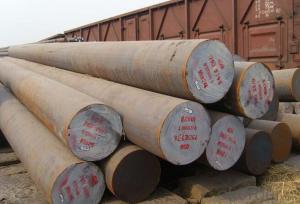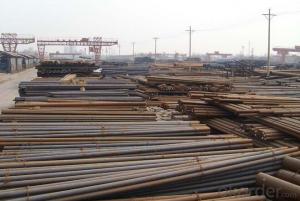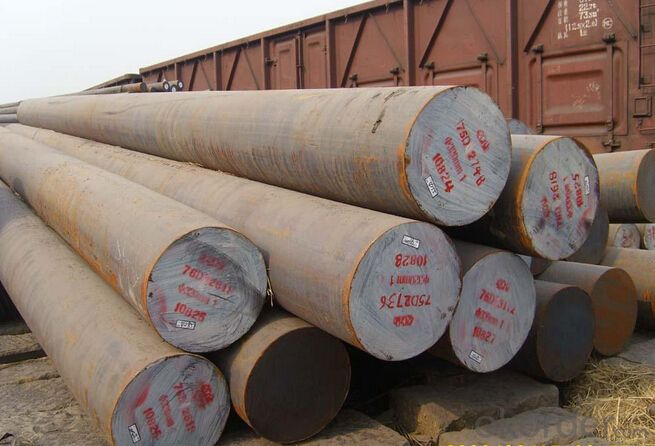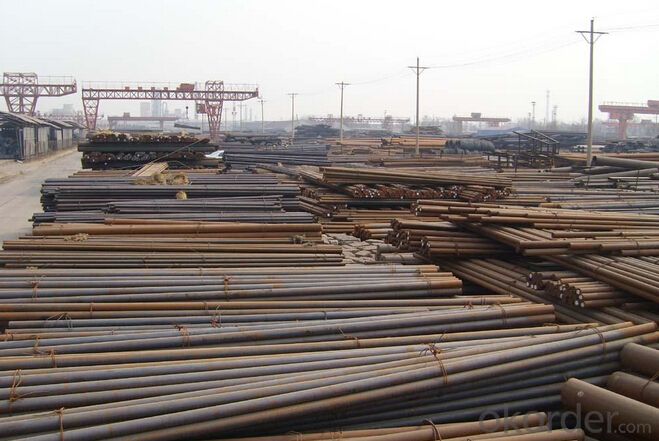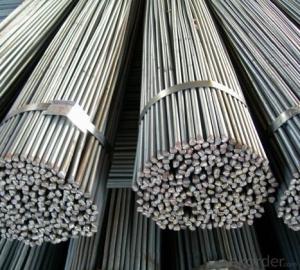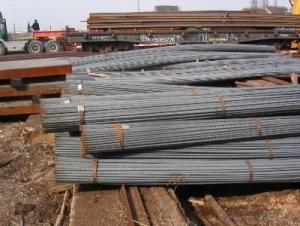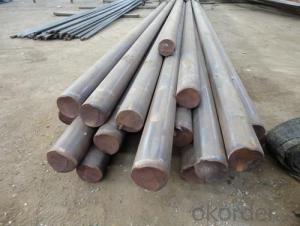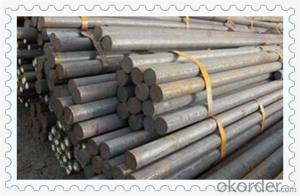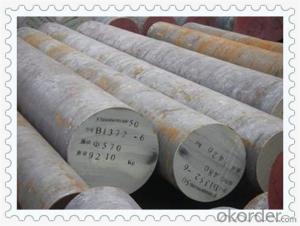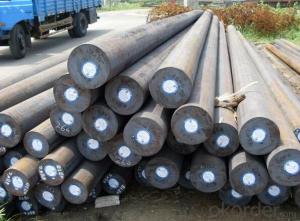Hot Work Die Steel Round Bar H12 Steel
- Loading Port:
- China main port
- Payment Terms:
- TT OR LC
- Min Order Qty:
- 25 m.t.
- Supply Capability:
- 10000 m.t./month
OKorder Service Pledge
OKorder Financial Service
You Might Also Like
Specification
The details of our Steel
1. Produce Standard: as the GB, AISI, ASTM, SAE, EN, BS, DIN, JIS Industry Standard
2. Produce processes: Smelt Iron -EAF smelt Billet - ESR smelt Billet -Hot rolled or forged get the steel round bar and plate
3. Heat treatment:
Normalized / Annealed / Quenched+Tempered
4. Quality assurance:
All order we can received Third party inspection, You can let SGS, BV,.. and others test company test and inspect our products before Goods shipping.
Product information
1.Specification of H12 steel | |||||||||||||
Round bar | Diameter(mm) | Length (mm) | |||||||||||
70~600 | 2000~6000 | ||||||||||||
Plate | Thickness(mm) | Width (mm) | Length (mm) | ||||||||||
25~400 | 100~810 | 2000~5800 | |||||||||||
The specification can be customised! | |||||||||||||
2.Chemical compositon of H12 steel | |||||||||||||
NO. | C | Mn | Si | Cr | Mo | V | P | S | |||||
Aisi H12 | 0.28~0.55 | 0.15~0.45 | 0.10~0.40 | 2.70~3.20 | 2.60~3.00 | 0.40~0.70 | ≤0.030 | ≤0.030 | |||||
3.Delivery condition | |||||||||||||
Standard Number | Annealing | Heat treatment temp( °C ) | HRC Secondar Hardness | ||||||||||
H12 | ≤235 | Hardening: 1020 Tempering: 530~560 | 47~54 | ||||||||||
4.Heat treatment | |||||||||||||
1.Quench:1000-1040`C via 600`C and 850`C, preheating oil or wind cooling 2.Temper temperature should be higher than working temperature in order to stabilize the working size of mold 3.Heat up to 650°C of average temperature in order to eliminate the machined stress, 500 °c air cooling after electric cooker cooling 4.Tempering, 800-850 °c ,slow cooling after diathermia 5. Melting Process of SKD61 steel rod | |||||||||||||
1.EAF: Electric Furnace+LF+VD(Optional) | |||||||||||||
2.ESR: Electric Furnace+LF+VD+Eleroslag Remelted(Optional) | |||||||||||||
UT Class of SKD61 steel rod | |||||||||||||
5.Characteristic of H12steel | |||||||||||||
(1) High strength toughness, high chromium steel | |||||||||||||
(2) Good hot intensity and rigidity. | |||||||||||||
(3) Good tenacity, hot tirdness nature and wearable in medium temperature | |||||||||||||
(4) Empty quench in low Austenitizing temperature condition, little distortion after heat treatment. | |||||||||||||
6.Application | |||||||||||||
(1) Used in hard plastic mold , aluminum, zinc alloy die-casting mold , forging hammer. | |||||||||||||
(2) high speed precision forging die insertsdrawing dies, plate dies and edge or cold shears,etc. | |||||||||||||
(3) All products' technology request and dimensions | |||||||||||||
Product show

Workshop show

Shipping
1. FedEx/DHL/UPS/TNT for samples, Door-to-Door;
2. By Air or by Sea for batch goods, for FCL; Airport/ Port receiving;
3. Customers specifying freight forwarders or negotiable shipping methods!
Delivery Time: 3-7 days for samples; 5-25 days for batch goods.
Payment Terms
1.Payment: T/T, L/C, Western Union, MoneyGram,PayPal; 30% deposits; 70% balance before delivery.
2.MOQ: 1pcs
3.Warranty : 3 years
4.Package Informations: 1) EXPORT, In 20 feet (GW 25 ton) or 40 feet Container (GW 25 ton)
2)as customer's requirement
Why choose us?
(1) The leading exporter in China special steel industry.
(2) Large stocks for various sizes, fast delivery date.
(3) Good business relationship with China famous factories.
(4) More than 7 years steel exporting experience.
(5) Good after-sales service guarantee.
- Q: What are the different quality control measures for special steel production?
- There are several quality control measures for special steel production, including thorough material inspections, precise chemical composition analysis, stringent dimensional and shape control, non-destructive testing methods such as ultrasonic and magnetic particle inspections, and rigorous mechanical property evaluations. Additionally, heat treatment processes and surface treatments are closely monitored to ensure the desired properties and surface finish of the special steel. Continuous monitoring and quality checks are essential throughout the production process to maintain the highest standards and meet customer requirements.
- Q: What are the emerging trends in the special steel industry?
- Some emerging trends in the special steel industry include the increasing demand for high-strength and lightweight materials, the growing adoption of advanced manufacturing technologies such as 3D printing, the focus on sustainability and environmental impact reduction, and the rise of electric vehicles driving the need for specialized steel grades. Additionally, there is a shift towards customization and tailored solutions to meet specific industry requirements.
- Q: How is special steel used in the production of precision tools?
- Special steel is used in the production of precision tools due to its unique properties such as high strength, durability, and resistance to corrosion. This steel is carefully engineered and manufactured to meet specific requirements, enabling the production of precise and reliable tools. The use of special steel in precision tool manufacturing ensures that these tools can withstand heavy usage, maintain their sharpness, and provide accurate results, making them crucial for various industries such as automotive, aerospace, and engineering.
- Q: How is structural steel used in building construction?
- Structural steel is a crucial material in building construction as it provides strength, durability, and flexibility to the overall structure. It is used to create the framework or skeleton of a building, including beams, columns, and trusses. These steel components support the weight of the building and distribute it evenly, ensuring stability and safety. Additionally, structural steel can be easily fabricated and assembled on-site, making it a cost-effective and efficient solution for various types of construction projects.
- Q: Can special steel be used in food processing applications?
- Yes, special steel can be used in food processing applications. Special steel, such as stainless steel, is commonly used in the food industry due to its excellent corrosion resistance, hygienic properties, and durability. It is safe for food contact, easy to clean, and does not react with acidic or alkaline substances.
- Q: What are the common alloying elements in special steel?
- The common alloying elements in special steel are chromium, manganese, molybdenum, nickel, and vanadium.
- Q: Can special steel be used in the marine industry?
- Yes, special steel can be used in the marine industry. Special steels such as stainless steel or corrosion-resistant alloys are commonly used in the marine industry due to their high strength, durability, and resistance to corrosion in harsh marine environments. These materials are utilized for various applications including shipbuilding, offshore structures, and marine equipment to ensure long-lasting performance and safety at sea.
- Q: Can special steel be used in food processing?
- Yes, special steel can be used in food processing. Special steels, such as stainless steel, are commonly used in the food processing industry due to their unique properties that make them suitable for handling food safely. Stainless steel is resistant to corrosion, which makes it ideal for handling acidic or salty foods without the risk of contamination. It is also non-reactive, meaning it does not release any harmful substances into the food during processing. Additionally, stainless steel is easy to clean and maintain, ensuring high hygiene standards in food processing facilities. With these qualities, special steels like stainless steel are widely used in the production of food processing equipment, such as tanks, pipes, and utensils.
- Q: What are the different cutting grades of special steel?
- Various industries commonly utilize multiple cutting grades of special steel, each possessing specific properties and characteristics tailored for different cutting applications. High-speed steel (HSS), for instance, is renowned for its exceptional hardness, wear resistance, and heat resistance, enabling it to retain its hardness under high temperatures, rendering it perfect for high-speed machining operations. Another versatile cutting grade is tool steel, celebrated for its high hardness, toughness, and abrasion resistance, making it suitable for various cutting tools, dies, and molds. Stainless steel, on the other hand, is a sought-after cutting grade due to its corrosion resistance and durability, particularly in industries where precision cutting and cleanliness are paramount, such as food, medical, and automotive sectors. Carbon steel, a commonly used cutting grade, boasts impressive strength and toughness, making it ideal for cutting tools, knives, and blades. However, it requires proper maintenance and care to prevent rusting, as it is susceptible to corrosion. Conversely, alloy steel is a cutting grade created by combining different elements to enhance its properties. It offers improved hardness, strength, and wear resistance, rendering it suitable for high-stress cutting applications prevalent in the aerospace, automotive, and construction industries. These examples merely scratch the surface of the diverse range of cutting grades of special steel available. Each grade possesses unique properties and advantages, empowering manufacturers to select the most appropriate grade based on specific cutting requirements and conditions.
- Q: What are the properties of copper alloys?
- Copper alloys have various properties that make them valuable in different applications. They possess high electrical and thermal conductivity, making them suitable for electrical wiring and heat exchangers. Copper alloys also exhibit excellent corrosion resistance, making them ideal for plumbing systems and marine applications. Additionally, they offer good malleability and ductility, allowing for easy shaping and forming. Copper alloys can be further enhanced with the addition of other elements to improve specific properties such as strength, hardness, or resistance to specific environments.
Send your message to us
Hot Work Die Steel Round Bar H12 Steel
- Loading Port:
- China main port
- Payment Terms:
- TT OR LC
- Min Order Qty:
- 25 m.t.
- Supply Capability:
- 10000 m.t./month
OKorder Service Pledge
OKorder Financial Service
Similar products
Hot products
Hot Searches
Related keywords
